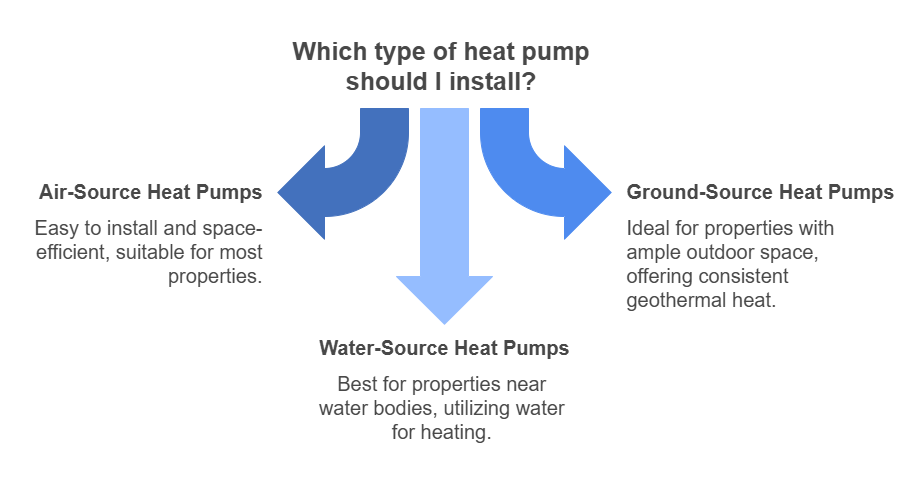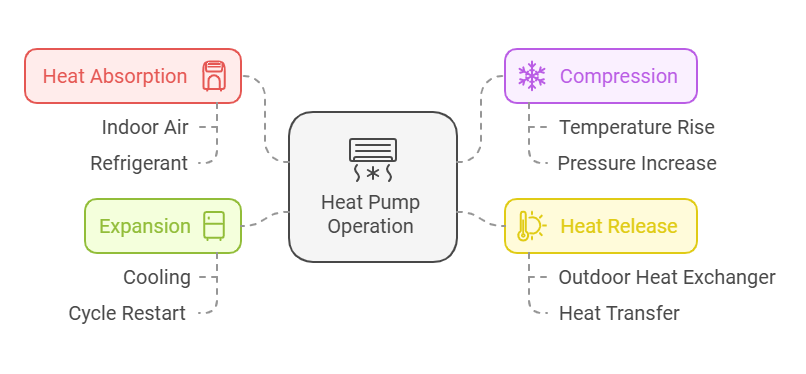Can Heat Pumps Both Heat and Cool Your Property?

Heat pumps continue to grow in popularity, with many households opting for them instead of fossil fuels. The many government grants available also mean you can save money on heat pump installation while looking forward to long-term energy savings.
Unlike many other heating solutions, heat pumps have a unique ability to regulate temperatures. Does this mean they can also cool properties? Yes.
Find out everything you need to know about the heating and cooling properties of these pumps in our complete guide.
What are heat pumps?
Heat pumps are innovative solutions that play key roles in the battle to save the planet. They don’t burn fossil fuels and are a renewable energy source, transferring heat from one source to another. There are three types of heat pumps available:
- Air-Source Heat Pumps: These heat pumps are the most popular option, as they’re easy to install and don’t require much space. An air-source heat pump system collects heat from the air and transfers it into your property.
- Ground-Source Heat Pumps: If you have enough outdoor space, you can benefit from the consistency of geothermal heat pumps. They collect heat from the earth’s stable temperatures and transfer it into the property through a pipework system.
- Water-Source Heat Pumps: Properties with a nearby pond, lake or river can install a water-source heat pump, but this isn’t an option for everyone. These pumps collect heat from the water and transfer it into the property.

How do heat pumps work?

To understand how the pumps can cool properties, we first need to cover their heating process. All heat pumps use a refrigerant cycle when transferring heat, which is a highly efficient process. Here’s a quick breakdown of both modes:
Heating Mode:
- Absorb: The pump uses refrigerant fluid, which flows through a heat exchanger and absorbs heat from a natural source.
- Compress: The absorption process turns the refrigerant into a warm gas, so it needs to be compressed. A compressor will increase the refrigerant’s temperature.
- Release: Modern heat pump systems refrigerant will flow through an interior heat exchanger and then release its heat into the air or another system (like underfloor heating and radiators).
- Expand: Once the refrigerant expands and cools down, it returns to the heat exchanger and repeats the entire process.
Cooling Mode:
- Heat Absorption: Heat pumps cool a property by working in reverse. The refrigerant collects heat from the air inside your property.
- Compression: The refrigerant goes through a compression process to raise its temperature.
- Heat Release: Once compressed, the refrigerant will transfer its heat to an outdoor heat exchanger.
- Expansion: Once the heat is released, the refrigerant cools and prepares to absorb the indoor heat again.
Can all heat pumps cool?
It’s important to remember that older heat pumps might not have cooling functions. In recent years, we’ve witnessed heat pump technology reach new heights, but whether or not it cools depends on which emitter it’s connected to.
Hybrid heat pump systems
Hybrid pumps blend technologies to effortlessly provide hot and cold air. Those that combine a gas boiler with air-to-water heat pump technology can also connect to an outdoor multi-unit. The setup links indoor air conditioners with traditional heating or hot water systems.
Heat pump convectors
Heat pump convectors (fan coil units) work with a heat exchanger and fan to provide versatility. When set to cooling mode, the pump circulates chilled water through the convector, allowing the cold water to absorb any heat and cool down the room.
Underfloor systems
Everyone’s familiar with underfloor heating systems, but did you know that heat pumps can also cool a room by using underfloor pipes? By passing cold water through the pipes, you’ll notice immediate benefits, including a lower room temperature.
Are heat pumps sustainable methods for cooling a property?
Heat pumps are more energy efficient than many alternatives, as they transfer heat energy instead of burning fossil fuels to produce it. When it comes to cooling your home, heat pumps are a more effective solution than a traditional air conditioner or fan.
While the pumps run on electricity, you can install solar panels to reduce your costs and achieve total energy independence. Yes, heat pumps cost more than standard air conditioners, but they’re also a long-lasting solution that can be combined with multiple other systems.
Let’s take a look at the many benefits of investing in a home heat pump install.
- Energy Efficiency: Heat pumps require less energy than traditional air conditioners, which can reduce your costs over time. When combined with solar panels, they’re even more efficient, as the electricity generated from solar power reduces your reliance on the grid.
- Year-Round Functionality: While traditional air conditioning systems have some benefits, you’ll need a heating system for those winter months. In contrast, heat pumps are a year-round solution that ensures consistent heating and cooling.
- Environmentally Friendly: Heat pumps need electricity to run, but even without solar panels, they’re still energy-efficient. Research shows that they can significantly reduce carbon emissions, making heat pumps vital weapons in the fight to save our planet (IEA).
- Even Cooling: Heat pumps are able to distribute cool air evenly throughout an entire property, ensuring comfortable indoor temperatures. Air conditioners offer more consistency than fans, but a heat pump is ideal for warm summers.
- Quiet Operation: Modern heat pumps are designed for quiet operation, ensuring minimal to no disruptions. If you notice your pump is making noise, it might be due to clogged heat pump filters on indoor units or other maintenance issues.
- Long-Term Savings: Lower energy bills are something we all want, and heat pumps can get you there. They’re also highly durable and can last over 20 years with proper maintenance.
The bottom line
Heat pumps are fast becoming a go-to solution for properties across the UK looking for year-round temperature regulation. If your’e thinking about making the switch to a heat pump or want to change your existing system get in touch today for a free heat pump installation quote.
Get a free heat pump installation quote
We Beat or Match Any Quote
Phone us to beat or match British Gas or Homeserve quotes, Terms apply.
Serious About Service
24/7 claims support & rated Excellent on Trustpilot
Cover Match Guarantee
£50 gift card if we don’t cover something British Gas or Homeserve do, terms apply
All Gas Boilers Covered
All makes and models, regardless of age


